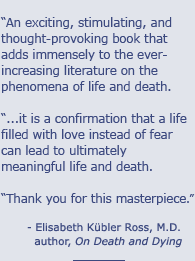 | ||
|
About the book: 
Topics include:
We welcome your dialog about Avatar Adi Da and the book Easy Death.
Please write to us with your questions and comments. |
Avatar Adi Da's Wisdom on griefAn excerpt from "The Celebration of Passing" in Easy Death (p. 291 - 92) AVATAR ADI DA SAMRAJ: If you have any leftover business with someone, you should resolve it with the person before he or she dies—and not wait until he or she is already involved in the process of dying. You really should not leave that leftover business unfinished If there is anything left over, and the person is already dying, then you can (in a quiet way) still do the work of forgiveness — but it is best not to become involved in dramatizations of heavy grief and exaggerated emotion, which do not generally serve dying people. Such dramatizations on the part of others trap their attention and tend to confuse them and make them feel they are not free to leave. Generally, such dramatizations are not appropriate. The circumstance of dying should be calm and straightforward and sensitive to the dying person. The signs the living give should be the signs of ego-transcendence. Your manner should correspond to the instruction you are giving to the dying person. This is important. Of course there is grief, but grief should not become a dramatization that could disturb the dying individual. If people become overwhelmed with grief, it is best that they leave the room for a time and handle their grief with their friends. It is for this reason that you should prepare not only the dying person but also the people who surround the body of the dead person during the vigil. Much of what passes for service to the dead in the common world is a ceremony of grief. Because people do not quite believe that there is any continuation after death, they take the opportunity to indulge in grief — talking about the old times, weeping, getting together and crying on one another's shoulders, and saying a few things to the effect of, "Maybe so-and-so is still up there in heaven watching us", but otherwise clinging to that individual, even rehearsing that clinging for several days. This is generally not useful to anyone — those who are grieving or those who are dead or dying. It is not that grief should be cancelled, but the best form grief can take is continuous feeling-association with the dying or dead person — and release, not only release of one's grief but release of the other. Adaptation to the new situation should be the work of the observers of the dying and death of another as well as the work of the individual who is dying or who has passed on. Read other excerpts from Easy Death
Contact Us::Privacy Policy::Related Sites::Audio-Video::Home Page
© 2008 The Avataric Samrajya of Adidam Pty Ltd, as trustee
|
|


